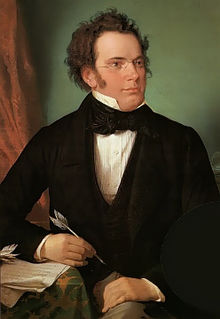January 28, 2019. Old and new; composers and performers. This week has so many anniversaries that they turn our post into a list, but we’d rather that than omit anybody. Five composers were born this week; they span two and a half centuries, from the Baroque to today. The oldest is Alessandro Marcello, born on February 1st of 1673. His younger brother, Benedetto Marcello, is better remembered these days, but Alessandro’s Oboe Concerto (here) was good enough for Bach to transcribe it for the keyboard solo; we now know it as Bach’s Concerto BWV 974.
Franz Schubert was born on January 31st of 1797 in Himmelpfortgrund, now part of Vienna’s  9th district. Undoubtedly one of the greatest composers in the history of European music, he wrote, during his short thirty-one-year life, an astounding number of masterpieces. In their profundity, his late piano sonatas could be compared only to those of the late Beethoven. His symphonies are among the best in the 19th century literature, his sacred works are very interesting, but it’s the Lieder, the art songs, that truly set him apart. His song cycles, Die schöne Müllerin, Winterreise, Schwanengesang, are works of pure genius. And so are some individual songs. Here, for example, is An Sylvia. It’s sung by a young American mezzo, Clara Osowski. Mark Bilyeu is on the piano.
9th district. Undoubtedly one of the greatest composers in the history of European music, he wrote, during his short thirty-one-year life, an astounding number of masterpieces. In their profundity, his late piano sonatas could be compared only to those of the late Beethoven. His symphonies are among the best in the 19th century literature, his sacred works are very interesting, but it’s the Lieder, the art songs, that truly set him apart. His song cycles, Die schöne Müllerin, Winterreise, Schwanengesang, are works of pure genius. And so are some individual songs. Here, for example, is An Sylvia. It’s sung by a young American mezzo, Clara Osowski. Mark Bilyeu is on the piano.
Felix Mendelssohn was also born this week, on February 3rd of 1809. We just talked about Schubert; Mendelssohn was one of the key people who promoted Schubert’s music which – inexplicably – faded from people’s memory soon after Schubert’s death. He, for example, premiered Schubert’s Symphony no. 9 in 1839 (the manuscript was discovered by Robert Schumann). You can read about Mendelssohn here and here. We understand that Mendelssohn, one of the greatest composers of the 19th century, deserves much more, and we’ll try another time. For now, here’s Mendelssohn’s String Quartet No. 6 in F minor, Op. 80. It’s his last large-scale work and was completed in September of 1847, as a “Requiem” for his beloved sister Fanny, who died in May of that year. Felix would be dead two months later, on November 4th of 1847. The performers are the Artemis Quartet.
Two very different modern composers were also born this week: John Tavener and Luigi Nono, Tavener on January 28th of 1944, Nono – on January 29th of 1924. Their art is a testimony to the tremendous depth and diversity of modern music. Tavener, a deeply devout man (he converted from the Presbyterian to the Orthodox church) wrote mostly religious music. In its stillness, the music of Tavener reminds us that of Arvo Pärt. Here’s his The Last Sleep of the Virgin for a String quartet and handbells. It’s performed by the Chilingirian Quartet and Iain Simcock, a composer and organist, playing the bells. Luigi Nono was a very different kind of composer: a dedicated avant-gardist, he was close to his Darmstadt fellows such as Karlheinz Stockhausen and Pierre Boulez. Here’s an example of his work, a suite from Prometeo, a theatrical work, which could be called opera or a set of oratorios, though Nono disliked typecasting his compositions. Claudio Abbado leads the Lucerne Festival Orchestra and soloists.
Four great performers were also born this week. None of them need an introduction: Arthur Rubinstein, on January 28th of 1887, Fritz Kreisler – on February 2nd of 1875, Jascha Heifetz – on the same day but in 1901, and Renata Tebaldi, the great soprano and Maria Callas’s rival – on February 1st of 1922.
| Source: | https://www.classicalconnect.com/node/12852 |
| Website: | Classical Connect |